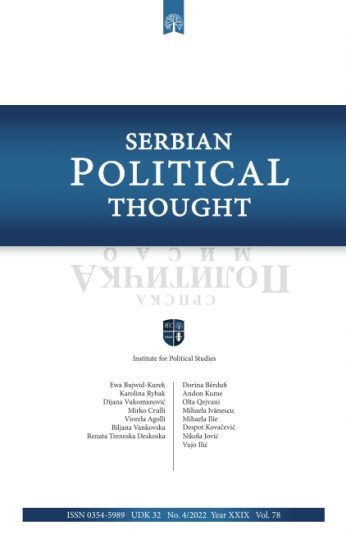THE PANDEMIC WORLD OF COVID-19 IN EUROPE: POLITOLOGICAL REFLECTION ON STATE OF EXCEPTION IN SELECTED COUNTRIES FROM THE PERSPECTIVE OF SOCIAL POLICY MODELS
The state of exception is implemented to protect the security of citizens and public order. During that time the human rights become limited in favor of public authorities. In the face of the COVID-19 pandemic, only some countries in Europe have declared a . . .
HYBRID ELECTION MANAGEMENT METHODS DURING THE COVID-19 CRISIS
This paper is based on qualitative secondary data analysis to provide more comprehensive insights into innovative electoral policy choices of election management bodies (EMBs), faced with multiple challenges of COVID-19 to different aspects of organisation . . .
CORONAVIRUS AND SCIENCE-RELATED COMMUNICATION BY POPULIST PARTIES
The relation between science and populism has already been investigated by relevant sociopolitical literature. However, the Covid-19 pandemic has produced remarkable changes in how politics, science, and society relate to each other. Therefore, there is a . . .
POPULISM DURING THE COVID-19 PANDEMIC IN THE WESTERN BALKANS
This paper aims to develop an analysis of how the Covid-19 pandemic influenced populist trends in the Western Balkan countries. Covid-19 pandemic impacted many sectors within the states themselves including health, economy, education, etc. and it produced . . .
COVID-19 AND THE MACEDONIAN ELECTIONS 2020/2021: A STORY OF DOUBLE STANDARDS
The paper aims to disclose the (de)securitization of Covid-19 during the two Macedonian electoral processes (i.e. the 2020 parliamentary and 2021 local elections) in accordance with the ruling elites’ liking. The basic premise is that the pandemic has catalyzed . . .
COVID-19 AND ELECTIONS IN NORTH MACEDONIA
When COVID-19 pandemic was announced in March 2020, North Macedonia was in the middle of the electoral process, with a dissolved Parliament and a few days before the start of the electoral campaign. The elections were postponed because the threats of the virus . . .
PARLIAMENTARY ELECTIONS IN ALBANIA DURING THE COVID-19 PANDEMIC CIRCUMSTANCES THROUGH POLITICAL AND LEGAL LENSES
As one of the Balkan post-communist countries, Albania faces different hindering factors in the process of constituting election’s democracy. In the parliamentary election of April 2021, Albania was challenged by an additional extraordinary obstacle, of . . .
PANDEMIC SIDE-EFFECTS OR SAME OLD ELECTORAL APATHY? THE IMPACT OF THE COVID-19 CRISIS ON THE 2020 PARLIAMENTARY ELECTIONS IN ROMANIA
The year 2020 was an electoral year in Romania, with local and parliamentary elections being held in September and December. In the midst of the pandemic crisis, with new rules to be followed, both during the electoral campaign and at the polls, none of the . . .
THE RISE OF A NATIONALIST-POPULIST PARTY IN ROMANIA – THE ALLIANCE FOR THE UNION OF ROMANIANS (AUR)
During the last few years, while, in many countries, political leaders and supporters of liberal democracy were facing new and unexpected challenges due to the rise of populist radical right tendencies, Romania seemed to be immune to such temptations. The . . .
THE IDEOLOGICAL INCONGRUENCE OF NEW POLITICAL PARTIES AND ORGANIZATIONS: CASE STUDY “MOVEMENT OF FREE CITIZENS” AND “DO NOT LET BELGRADE D(R)OWN”
The main subjects of this article are new political parties and organizations and their ideological incongruence as setbacks for root in society and institutionalization. The party system in Serbia has changed in aspects of stability and relevance of political . . .
PARLIAMENTARY AND ELECTION BOYCOTTS IN HYBRID REGIMES: EVIDENCE FROM SOUTHEASTERN EUROPE
Why do some opposition parties in hybrid regimes escalate their strategies of contention from parliamentary to election boycotts, while others do not? Opposition parties in hybrid regimes engage with a repertoire of extra-institutional strategies, including . . .

